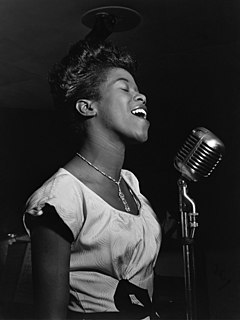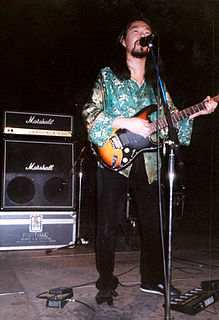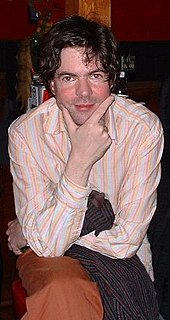A Quote by Terry Teachout
The Armstrong record that I personally like the most, is a recording of a song by Harold Arlen called, "I Got a Right to Sing the Blues" . Most of Armstrong's solos tended to stick pretty close to the melody. But for some reason, it's like he let go of the tether and suddenly he's playing this beautiful high, almost abstract line that's floating above the beat. I compare it to the way that a 19th century operatic tenor might have sang an Aria because he's just completely let loose of the background and he's making this magic sort of flying above the staff.
Quote Topics
Above
Abstract
Almost
Aria
Armstrong
Background
Beat
Beautiful
Because
Blues
Century
Close
Compare
Floating
Flying
Go
Got
Harold
High
Just
Let Go
Like
Line
Loose
Magic
Making
Melody
Might
Most
Personally
Playing
Pretty
Reason
Record
Recording
Right
Sang
Sing
Solos
Some
Song
Sort
Staff
Stick
Suddenly
Tenor
Way
Related Quotes
I had a dream that Louis Armstrong was playing the 'Swept Away' melody. I have no idea where it came from. But Louis Armstrong was playing it and singing the song to me. I woke up-it's a borrowed melody no doubt-and wrote it down. If I hear a song and I choose not to put it down, that's me neglecting to accept that song. I think there's a very spiritual and godly-type ting that happens, and it happens to way more people than we know. It's just that very few of us choose to engage it.
I don't know why people call me a jazz singer, though I guess people associate me with jazz because I was raised in it, from way back. I'm not putting jazz down, but I'm not a jazz singer...I've recorded all kinds of music, but (to them) I'm either a jazz singer or a blues singer. I can't sing a blues – just a right-out blues – but I can put the blues in whatever I sing. I might sing 'Send In the Clowns' and I might stick a little bluesy part in it, or any song. What I want to do, music-wise, is all kinds of music that I like, and I like all kinds of music.
I want to sing using a throatsinging style, like for example kargyraa, but at the same time sing it like a normal way. Maybe I will try some opera. To sing a melody, and to sing not only Tuvan traditional melodies, but I would like to try Western classics, blues. I think Tuvan music and American blues are very close to each other.
You see that in the news constantly; done both the right way and the wrong way. The most recent example I can think of, obviously, is Lance Armstrong, who got it all wrong. Who wanted to apologize strategically, instead of abjectly. What got me interested was the repetitive nature of it. There's something so ritualized about it. Then the ritual needs to be reenacted very carefully and pretty frequently - Tiger Woods, and now Manti Te'o and Lance Armstrong, and a little earlier Anthony Weiner or Eliot Spitzer.
I think that anybody from the 20th century, up to now, has to be aware that if it wasn't for Louis Armstrong, we'd all be wearing powdered wigs. I think that Louis Armstrong loosened the world, helped people to be able to say "Yeah," and to walk with a little dip in their hip. Before Louis Armstrong, the world was definitely square, just like Christopher Columbus thought.
I feel like I'm really accomplishing something with harmony and melody. Ultimately, again, I'm not a singer, some people can sing with an "I" or an "a," some people can sing and they can sang. I think I can "sang" more than anything. I'm not a formal singer and I'm an MC, but it's secondary to the second nature of just melody. You know but ultimately I'm a writer and I do soul music. Whether it's in song form or rhyme scheme, it's soul.
If you're in a subordinate position of some sort and pretty much all of us are at some point in our lives, your general tendency is to try and impress the people above you or person above you so well that they will like you, keep you or maybe promote you. In the process of doing that you are not aware that that person above has insecurities and if you try so hard they may see that you are after their job or that you are better than they are or they might envy the fact you are younger.
If you're recording the song on your four-track in your kitchen, when you finished writing the song, you're recording, and it's cool, and honor that. And maybe that's the version that should be released. And if you're recording the song again, it shouldn't be because there's a version you love that you're chasing. It should be because "You know what? I made a recording, but I don't love it emotionally." So, okay, then record again. And be in it and take advantage of the buzz and energy of "I'm getting to record right now!" It's such a beautiful and cool privilege.
Neil Armstrong was no Christopher Columbus. In most respects, he was better. Unlike the famous fifteenth century seafarer, Armstrong knew where he landed. He also spent his time in public service, not in jail, and his passing was marked by world-wide encomiums. He ended his days as a celebrated explorer rather than a royal inconvenience.



































